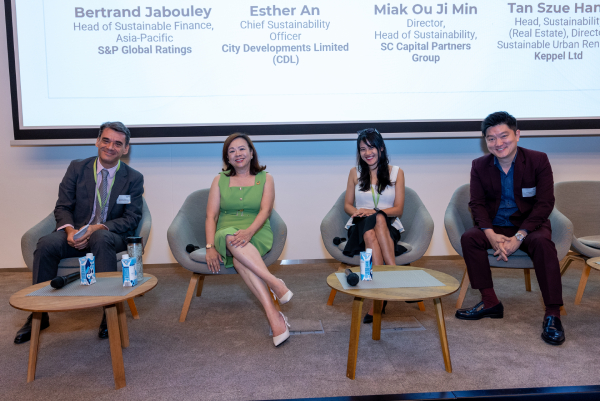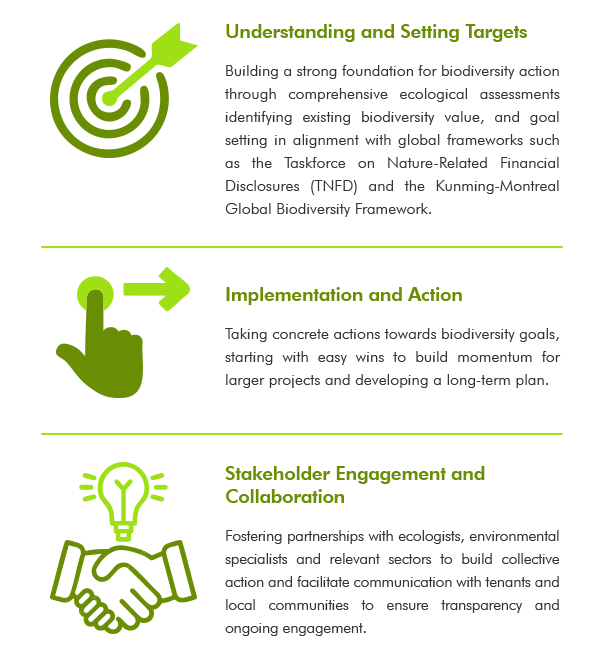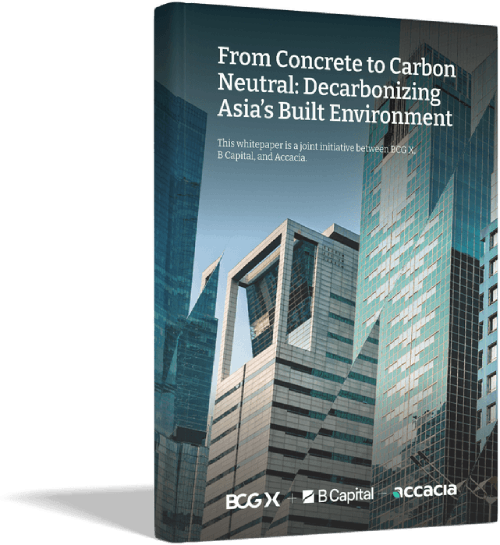
As ESG adoption in real assets accelerates, identifying the right technology remains a complex challenge. There is no one-size-fits-all approach—ESG tools must align with a firm’s portfolio, investment strategy and data maturity. At the APREA Singapore Conference, industry experts emphasized the need for flexible, value-driven solutions.
For firms like SC Capital Partners, a private equity real estate firm managing over 60 assets across diverse classes in Asia-Pacific, agility and pragmatism in ESG strategy are essential. Unlike traditional developers with long-term investment horizons, SC Capital Partner follows an opportunistic investment strategy, where holding periods vary and assets may be divested ahead of schedule in response to market dynamics. This variability renders costly, rigid digital tools impractical, says Miak Ou, Director and Head of Sustainability at SC Capital Partners.
“Technology must align with a firm's ESG maturity, portfolio strategy and data readiness,” says Ou. “What works for a long-term core asset might not necessarily work for an opportunistic investment with a short and unpredictable holding period.”
Firms should prioritize value-driven adoption over trends. SC Capital Partners, for instance, currently uses a structured Excel-based system – developed with consultants – as it is flexible, cost-effective, and well-integrated with current workflows. Rather than invest in proprietary tools, the firm integrates with operators’ existing digital platforms to reduce implementation risk and accelerate adoption.
The edge lies not in the tool itself, but in the ability to measure, analyse, and apply data to make better investment decisions. While digital tools enhance tenant and guest experiences, Ou notes that smart building technologies are especially impactful in sectors like co-living, student accommodation, and self-storage, where they drive operational efficiency. In hospitality, innovations like mobile check-ins and smart room controls prioritize personalization over full automation.
Among the panelists, Esther An, Chief Sustainability Officer at City Developments Limited (CDL) highlighted the importance of the built environment in contributing to a net zero carbon future. She shared how CDL has leveraged green building and energy-efficient technologies and practices to reduce operation costs without compromising on users’ productivity and comfort founded on its ethos of ‘Conserving as We Construct’ established in 1995. She pointed to rising carbon taxes and grid prices that will require businesses for deeper and greater sustainability integration and innovation. Digital tools are key to improving ESG data collation, analysis and reporting to meet the rising expectation of regulators, investors and financiers, she said.
“Applying AI to improve business operations is definitely a no-brainer,” An, said. “ The key is on how do you deploy it efficiently to achieve the desired impact? Over the past 10 years, we have been saving an average of $3 to $4 million a year thanks to the effective application of energy-efficient technologies and practices.” AI-powered facility management platforms have helped us to optimize resource use through reducing lighting, air conditioning, and manpower deployment in underutilized spaces. This approach extends to car parks and large-scale infrastructure, reducing costs and improving operational efficiency, she noted. Temperature and grid prices will continue to rise, AI and technologies application to improve performance will be critical to future-proof businesses.
The Social Pillar: A Growing Focus in ESG
While governance and environmental concerns often dominate ESG discussions, the social pillar—spanning diversity, well-being and community engagement—receives less attention. However, demand for human-centric real estate is growing, particularly in student housing and senior living. Investors and tenants increasingly prioritize inclusivity, mental well-being and social impact.
Real estate leaders must integrate social impact in ESG strategies to enhance community well-being, said Tan Szue Hann, Head of Sustainability (Real Estate), and Director of ESG Strategy (Fund Management) at Keppel Ltd. Keppel Bay Tower, Singapore’s first net-zero office building, exemplifies this with efficient air handling, smart lighting, improved air quality, and tenant engagement, boosting sustainability and long-term occupancy.
“Keppel will not just take on a new tool or a new piece of technology because it's required, there has to be a certain efficiency in it, and there has to be a certain value that's created as well,” Tan said.
Sustainability in Building Design and Retrofitting
Environmental responsibility is key to ESG, but real impact requires going beyond compliance. Firms must balance regulations with proactive measures like green certifications, carbon reduction and energy-efficient retrofits.
Research and development in carbon capture and nature-based solutions underscore the need for tech-driven approaches, An highlights. Singapore, in particular, faces unique sustainability challenges due to heat, land scarcity and limited renewable energy options. Rising temperatures and cooling demands require energy-efficient solutions such as adding fans to improve ventilation alongside air conditioning and adoption of paint with cooling and purifying effect.
She advocated that Nature-based solutions will be the way forward as climate crisis cannot be resolved without tackling nature crisis.
Tan cites Seoul’s INNO88 tower as a model for sustainability-driven retrofitting. New urban regulations required removing three floors, but a conscious decision was made to retain the majority of the building’s structure, leading to a retrofit that preserved 30,000 tons of embodied carbon, while cutting operational energy use by 30%, saving SGD 1 million annually. The upgrade also boosted the building’s valuation, attracting investors.
SC Capital Partners applies Building Information Modelling (BIM) across all data centre developments under its SC Zeus platform, Ou notes. BIM is critical for optimising energy use and reducing waste—both key in energy-intensive assets like data centres. While adoption in Asia remains uneven, including in Japan and South Korea, the firm has made BIM a baseline requirement to support stronger ESG and operational outcomes from day one.Tan cites Seoul’s INO88 tower as a model for sustainability-driven retrofitting. Heritage regulations required removing three floors, leading to a retrofit that preserved 40,000 tons of embodied carbon and cut energy use by 30%, saving SGD 1 million annually. The upgrade also boosted the building’s valuation, attracting investors.
The future of ESG in real estate hinges on balancing governance, social impact and sustainability. Technology drives efficiency and compliance, but the real value comes from turning data into action. As the industry evolves, ESG must stay at the forefront—ensuring profitability, resilience, and a healthier planet for future generations.
Read MoreThe pressures on biodiversity are increasing, making it critical for the real estate industry to consider its impact, particularly across the Asia Pacific region where Southeast Asia alone hosts nearly 20% of the world’s known species within just 3% of the global land area.
Biodiversity contributes significantly to the functioning of ecosystem services such as clean air and water, climate regulation and disaster risk reduction which are essential for human well-being and economic stability. However, this is threatened due to this region’s rapid urbanization, deforestation, and agricultural expansion. For example, air and water pollution are the highest environmental risks that urban Asian cities face, with air pollution being the cause of one in five deaths in India in 2019, resulting in economic losses of USD 36 billion.
Driven by growing investor concerns and the need for robust ESG disclosures, regulatory trends are increasingly focusing on biodiversity. Initiatives like the UK's Biodiversity Net Gain (BNG) and the emergence of frameworks like the Taskforce on Nature-related Financial Disclosures (TNFD) are putting pressure on companies to disclose their environmental impacts and demonstrate how they are contributing to nature conservation.

The real estate sector, a significant contributor to biodiversity loss through land use, consumption of raw materials and disruption of natural cycles, is central to this shift. An upcoming white paper developed by CBRE in collaboration with Nature Positive and the Metis Institute acknowledges this and aims to explore the feasibility and benefits of incorporating biodiversity into green leases in Southeast Asia. Green leases serve as an important link between landlord and tenants on the sustainable objectives of a building, and including biodiversity within would help to integrate both party’s interests.
The white paper acknowledges several challenges when addressing biodiversity risks. Adoption and support for nature-based solutions is low due to weak legislation, lack of awareness, and maintenance difficulties . Additionally, the intangible benefits of nature-based solutions make it hard to justify the capital investments.
Despite these challenges, the real estate sector has a unique opportunity to turn the tide. By integrating biodiversity into urban development, the industry can enhance urban resilience to climate change effects, such as flooding and heatwaves, improving business continuity and urban liveability. Furthermore, properties that incorporate green spaces and biodiversity measures often see increased market values, as investors are attracted to the operability and resilience of the building, along with higher tenant satisfaction.
While the path forward is fraught with challenges, the potential benefits of addressing biodiversity risks present a compelling case for action within the real estate industry.
To get started, the real estate industry can consider the following actions.

Prioritising biodiversity should be a necessity in sustainable urban development in Asia Pacific before it is too late to salvage local ecosystems. By setting clear targets, engaging stakeholders, fostering collaboration, and prioritising quick wins, the real estate industry can play a crucial role in preserving the region's rich biodiversity while reaping significant economic and social benefits.

Head of ESG Consulting & Sustainability,
APAC, Paia FROM CBRE

Head of WELL & Circular Economy
Paia FROM CBRE

Head of Nature Solutions
Paia FROM CBRE
Environmental sustainability has taken on increased global significance in recent years, with an increased focus on climate resilience and net-zero carbon (NZC) strategies. This is particularly relevant to the real estate industry as it seeks to future-proof real estate portfolios using effective climate risk management strategies. Environmental sustainability issues are equally applicable in both the developed and emerging real estate markets.
This report focuses on net-zero carbon strategies for real estate in India. We conducted interviews with leading players in India’s real estate industry. This enabled in-depth understanding and insight into the critical issues for achieving net-zero carbon in India and identified the most effective pathways forward for real estate. Many of the issues concerning India are equally relevant to other emerging markets in Asia, so this report should also appeal to a wider audience.
This study evaluates key barriers, challenges, and opportunities in the adoption of NZC and recommends strategies for the low-carbon transformation of India’s real estate sector.
Download the Report Read MoreGlobally and especially in Singapore, the race to Net Zero has long begun. Like running any race, the motivation and plan must be clear. This paper lays out the urgency and steps to win this race for both commercial real estate owners and occupiers.
Net Zero buildings enhance resilience to energy supply disruptions and reduce dependence on fossil fuels. Although there may be initial costs, long-term savings through reduced energy expenses and increased property value are significant benefits. Net Zero buildings also offer a healthier and more productive environment for tenants, leading to higher occupancy rates and rents.
Finally, a couple of case studies demonstrate the potential savings for typical landlords and occupiers in the commercial space from optimising energy use (without additional capital expenditures) through simulation-based solutions; adopting the smart scheduling of energy use can lead to substantial cost and emission reductions.
Download the Report Read MoreThe climate impact of the real estate sector cannot be understated, with buildings contributing nearly 40% of global carbon emissions. Asia, home to over half of the world’s urban population, plays a critical role in this equation, with the region’s emissions projected to increase as urbanization and development accelerate.
With approximately 70 billion square meters of real estate expected to be developed in Asia over the next two decades, the region has the potential to not only reduce emissions but to set new standards in sustainable urban planning and construction.
Key Decarbonization Strategies for Asia:

A Path Forward for a Sustainable Asia
The decarbonization of Asia’s built environment represents both a challenge and a $47 trillion economic opportunity, driven by the need to align with global climate goals while catering to the unique demands of the region. Achieving this requires a targeted approach, one that equips developers, investors, and policymakers with strategies that balance sustainability with Asia’s rapid growth.
To dive deeper into these strategies, download the whitepaper “From Concrete to Carbon Neutral: Decarbonizing Asia’s Built Environment”.

Founder, CEO
Accacia